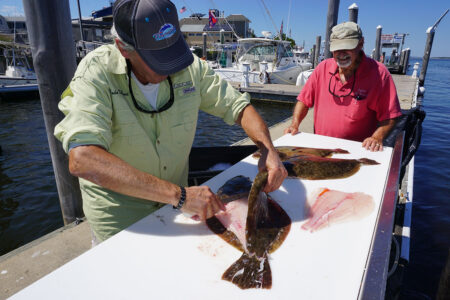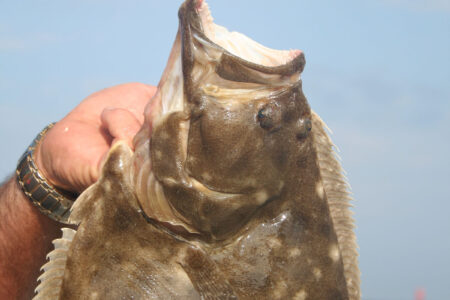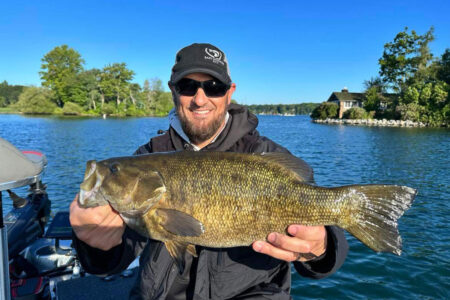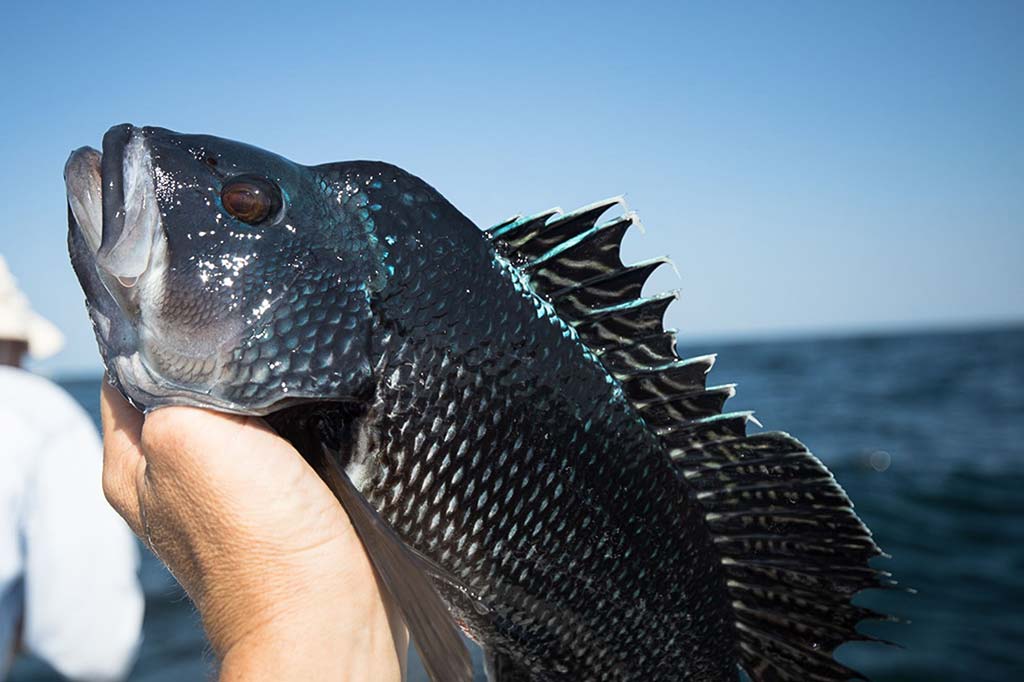
You don’t have to run far to put together a limit of sea bass
There is no shame in making a lot of sea bass trips. I know black sea bass are not our region’s greatest gamefish, but they hit a jig hard and the fish do look pretty in a cooler with ice. Last year I caught more sea bass than anything else. Most of these fish were caught on quick trips, fishing right out front, a mile off the beach. The opposite of a run to the southeast corner of Coxes or the Ranger Wreck.
We all learn by going. Fishing is the kind of thing that’s best absorbed on the grounds, being there. Each trip I make I figure something out—something about my boat, my electronics, something about how the wind and tide act, how bait moves on bottom. It’s almost endless. And its cumulative, one thing feeds another. This is why fishing is interesting to me. What’s going on with the ocean? What’s going on with the fish? I don’t tie my own jigs or make rods or stay up late at night doing internet searches for the latest fluke rig. I guess I’m not the most technical fisherman out there. I make do. Maybe that’s why I like sea bass: the fish are fairly easy to find and to fool.
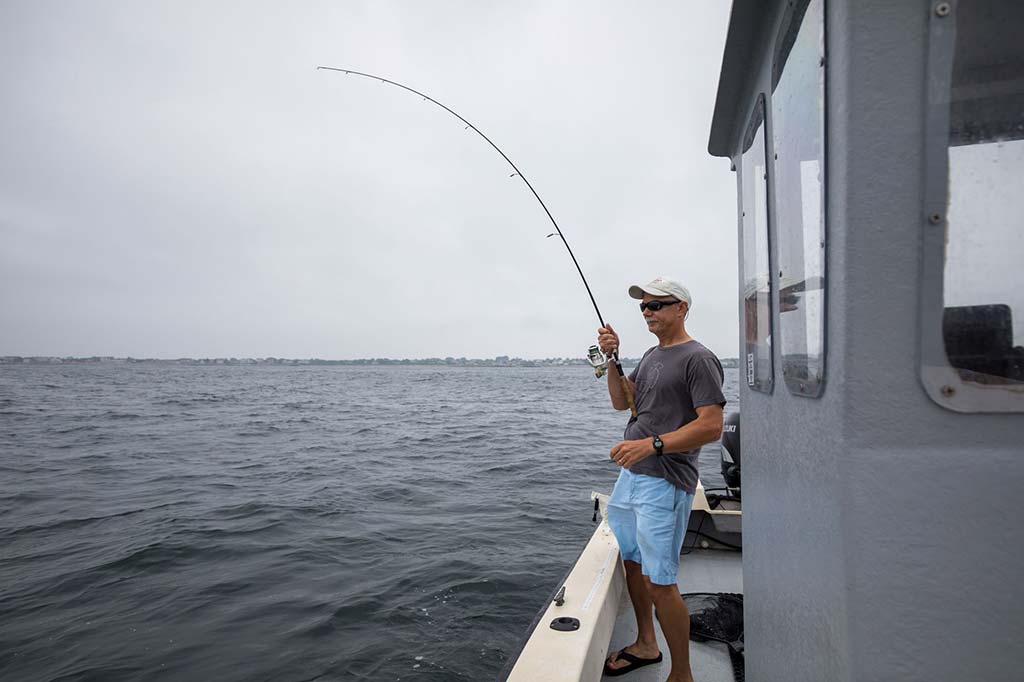
Where & How
They hit jigs. They hit teasers. They hit bait. The rigs are simple. In the spring off the shores of southern New England the sea bass tend to hang over smooth ground often on the edge of mud. But by the middle of June the fish start to head into the rocks. Most of us target sea bass over some kind of structure—wrecks, humps, patches of hard bottom. The fish will be on this structure until at least Halloween, before migrating offshore for the winter. It’s a long season. I think most of us, when we go sea bass fishing, are trying to target jumbos.
When I want to look for a big one, I spot-fish for them. Which means I’m hitting several known pieces of structure and giving them five minutes each. The spots I’m fishing are single boulders that stand out from the others, they’re taller, bigger, more angular than those around them and this is what makes them worth the focused effort. Or I anchor, send down clam bellies, wait for the big ones to find me. Few fish are more beautiful than a hump-headed jumbo all vibrant blue and incandescent in the summer sun. Sea bass are the kind of fish that save days. We start off the day fluke fishing and what inevitably happens, we catch sea bass. Or we start with cod or stripers, and the same thing happens, sea bass bail us out.
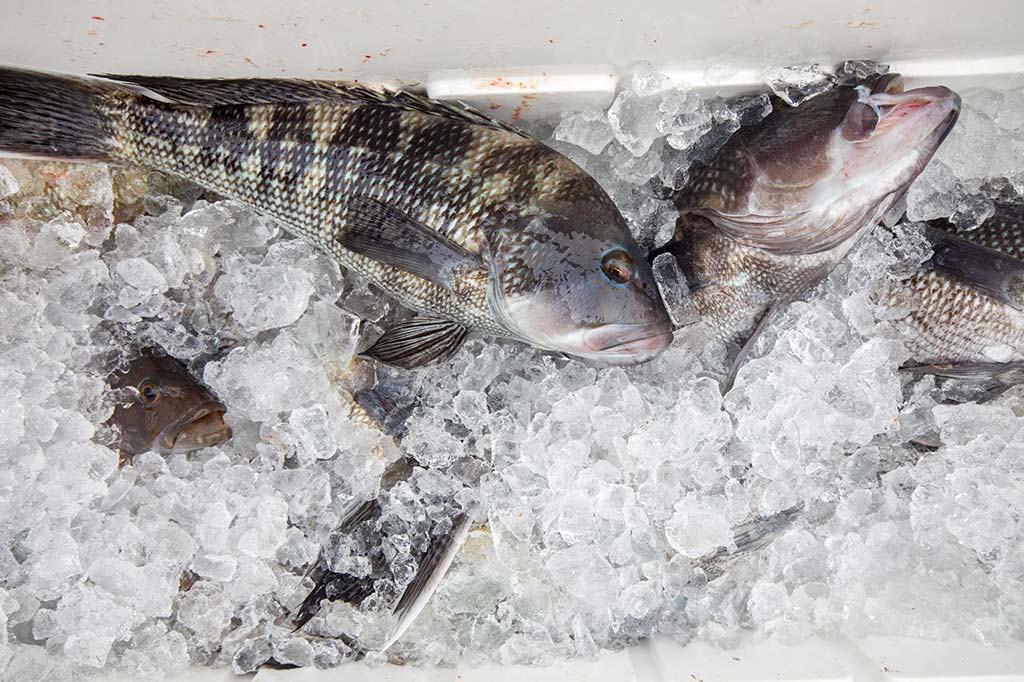
Another thing about sea bass is they come basically right up to the shore, in the shadow of the beach. I like the water from 35 to 80 feet. We all have this water – Buzzards Bay, Narragansett Bay, Block Island and Long Island Sound. The sea bass bottom, the sheer acreage of it, is massive. None of us have enough lifetimes to really know it all. With sea bass, I leave the dock and I’m fishing 20 minutes later. There is little commitment, low expectations. I can go days and days and days and not put fuel in the boat. I would call this low stress fishing. But it isn’t mindless. I don’t shut down and become a robot. Actually, I think I focus harder.
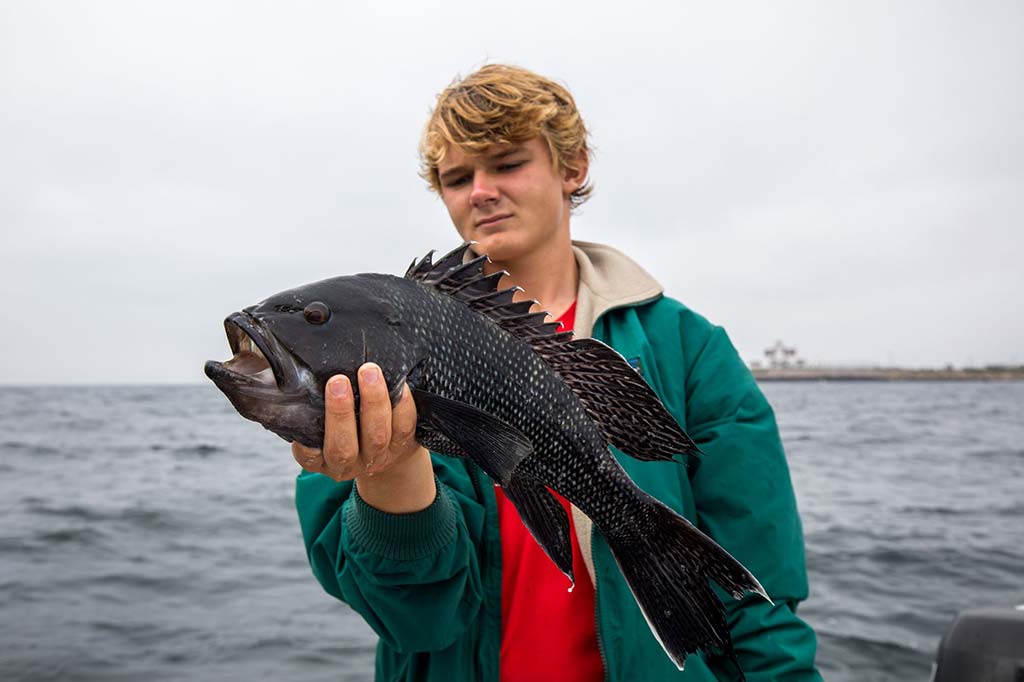
Close To Home
Fishing close to home does something. It tends to force us to think in smaller boxes. Those of us who grew up fishing small ponds for largemouth bass know all about this. The pond is incredibly finite, you can fish the whole thing, you can almost cast across it. There is no need to rush. You fish more carefully, each log, each pocket. The ocean, conversely, is big, on the scale of being intangible. We all stand before it and try to reduce it, shrink it down to something manageable. At home hanging over a chart at the dining room table, the distances seem possible. In one sweep with a finger, we can go from Newport to Cuttyhunk in a few seconds. But make that trip in a boat and you pass a lot of water, so we try and plan the day. We all fish against the clock. Each decision we make affects the whole equation. Do we move when the fishing is decent but not great? How far do we move? Two miles, ten? A lot of us waste a huge amount of time steaming around, thinking, doubting, rolling the dice. The best fishermen are masters at making the right decisions. Or they seem to.
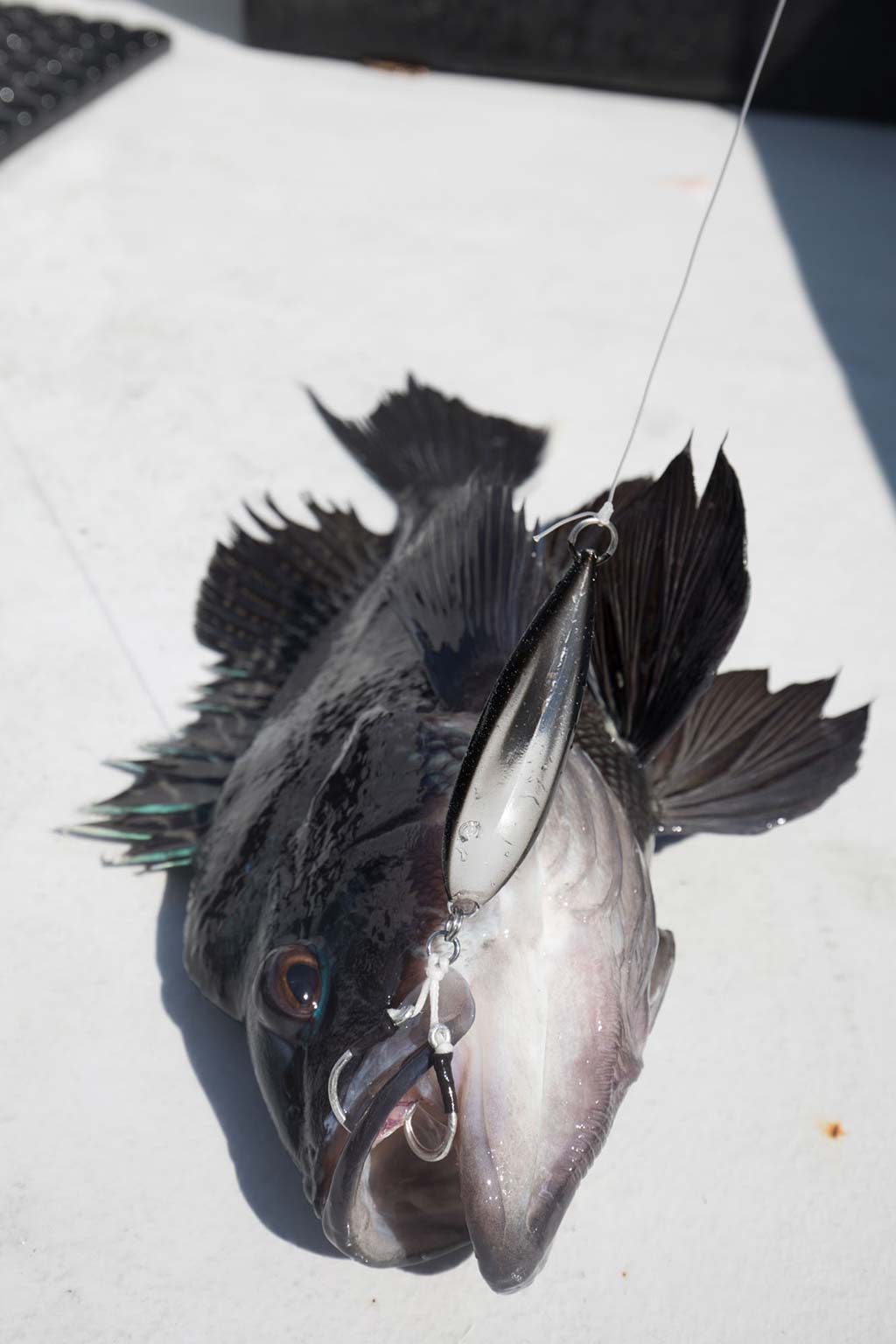
This is one reason I like fishing close to the dock. When I make lots of short trips, I feel that I strengthen my instinct. It all becomes familiar, like a farm pond, like a section of stream. Also, each time I’m on the boat, I fire up the electronics, and my fingers know what they are doing, the muscle memory is strong. If I saved my fishing energy for one big trip a week I don’t think I would gain the confidence: I’d always be feeling a little lost. Boat fishing is an activity of repetition. The more we go the easier it all gets. We become almost one with the boat. I work on a boat, professionally. It’s a pilot boat. We make lots of runs all year. If I go a week without making a pilot trip and then I have to do one at night in the fog I feel a little tense at first as my fingers try to recall exactly how it is all done. Adjust the radar, the chart plotter, get the generator and engines going, get off the dock, steam out, find the ship. It’s all about routine on boats.
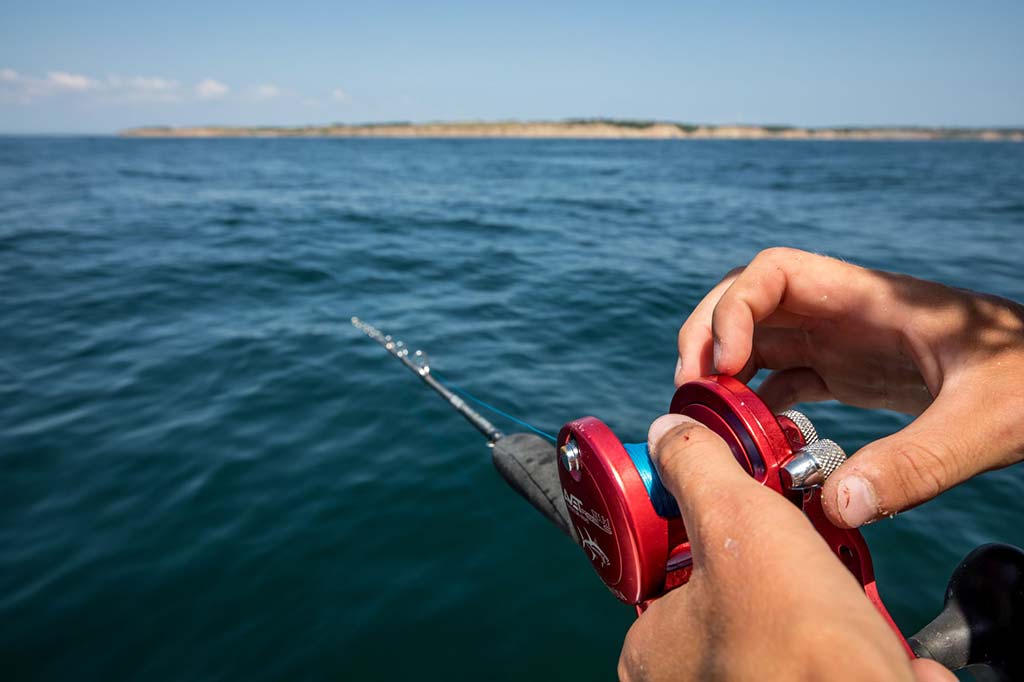
A Learning Fish
The sea bass seasons in New England don’t all line up nice and pretty. So it’s important to know the regs and make sure you don’t inadvertently cross state lines and break the law. It’s also important to remember that if you catch a fish legally in Connecticut and bring it into a Rhode Island boat ramp, where sea bass is still out of season, it would be considered an illegal catch and penalties may follow. It’s too bad the states can’t get together on this.
Sea Bass Seasons:
New York:
6/23 to 8/31 – 3 fish at 15 inches or greater.
9/1 to 12/31 – 7 fish at 15 inches or greater.
Connecticut:
5/19 to 12/31 – 5 fish at 15 inches or greater.
Rhode Island:
6/24 to 8/31 – 3 fish at 15 inches or greater.
9/1 to 12/31 – 7 fish at 15 inches or greater.
Massachusetts:
5/18 to 12/31 – 5 fish at 15 inches or greater.
Sea bass are a great fish to learn on. If you have a new hull and you want to get used to the boat, sea bass will help. You can fish weather. See how the boat drifts, see how the boat handles a beam-to chop. You can go out a mile in a stiff sea breeze, set up and see how much lead you need to hold, see if you can catch. If it’s too much all you need to do is turn around and head home. Fishing close to the harbor will also give you more trips, more familiarity. You can really dial in the local bottom. Find the ridges, the high ground. Find the individual rocks, the boulders. You start to hold pieces of ground in your head. You’ll get jumbo sea bass on these pieces, good fluke too. Don’t chase the headboats, try not to fish within a huge cluster of fish pots. Get the most out of the time by finding your own ground.
These short trips, the late afternoon run, the early morning run, whatever time you can carve out, are also great for bringing people who don’t fish much, or kids. You tell them, “Short trip, a few hours and we’ll be back.” People like to hear that. Many people don’t want to spend 15 hours fishing Coxes, but they want to fish, want to bring home dinner. Sea bass shine with this. My son and stepson love sea bassing—they love the fight and the aggressiveness, how fast we can limit out. But they also love going back to the dock, heading to the beach to surf with their friends.
